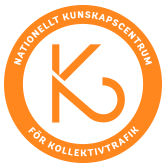Planning local and regional public transport in so-called ’transit corridors’ – i.e., to concentrate infrastructure and resources to few, but more attractive corridors in a city or a region – is commonplace in contemporary public transport planning. This has not always been the case, however.
In this thesis I analyze how transit corridors have come to dominate the policies and planning practices of public transport governance through a case study of Malmöhus County and Region Skåne between 1970 and 2020, and show how the organization of decision-making, planning practices and the spatial configuration of public transport have been central sites of an ongoing struggle between different actors and levels over influence over ideas and resources. Understanding the fundamental values and processes that shape public transport system and the conflicts that arise when values and actors collide can contribute to increased possibilities to shape a just and inclusive public transport system that enables sustainable mobility for people.
The research is based on qualitative analyses of archival records and interviews with individuals who were involved in the planning and politics of public transport in Malmöhus County and Region Skåne. Through an analysis of how change and permanence in the public transport system have been motivated and turned into institutional practice, the thesis shows how the transit corridor paradigm evolved in through an interplay between the regional political dynamics and the wider societal context. A recurring tension exists in public transport policy and planning between values of equity and efficiency on the one hand, and how these values are translated into the organization of public transport governance through policies of coordination and competition on the other. These values and policies have been decisive for the motivations to the organizational and spatial re/configurations of public transport since the introduction of regional public transport authorities in Sweden since the end of the 1970’s.
Initially, spatial and economic equity were leading principles that motivated a rapid expansion and distribution of the regional public transport system. At the turn of the 1990’s, a set of interlinked policy processes assisted the formulation of transit corridors as a strategic development policy for public transport in Malmöhus County. These ideas were institutionalized through a reorganization of public transport governance with a stronger regional mandate and a more peripheral role for the municipalities and was materialized through infrastructure investments in train and express bus systems at the expensive of areas with weaker demand. When Region Skåne was formed in 1999, the transit corridor paradigm was fully developed and contributed to shaping spatial relations in the new region and has continued to be a core in public transport policy in Skåne. However, despite (or perhaps because of) the dominance of transit corridors, conflicts persist between the parts of the region that have gained the most from transit corridor planning, and those that remain concerned over declining public transport supply from the planning orientation.
Constructing Transit Corridors: The Politics of Public Transport Policy and Planning in Malmöhus and Skåne 1970-2020
Jens Portinson Hylander, doctoral thesis, Lund University, December 2021
Rapportkategori:
Övrigt
Forskningsinriktning:
Forskningsprojekt:
